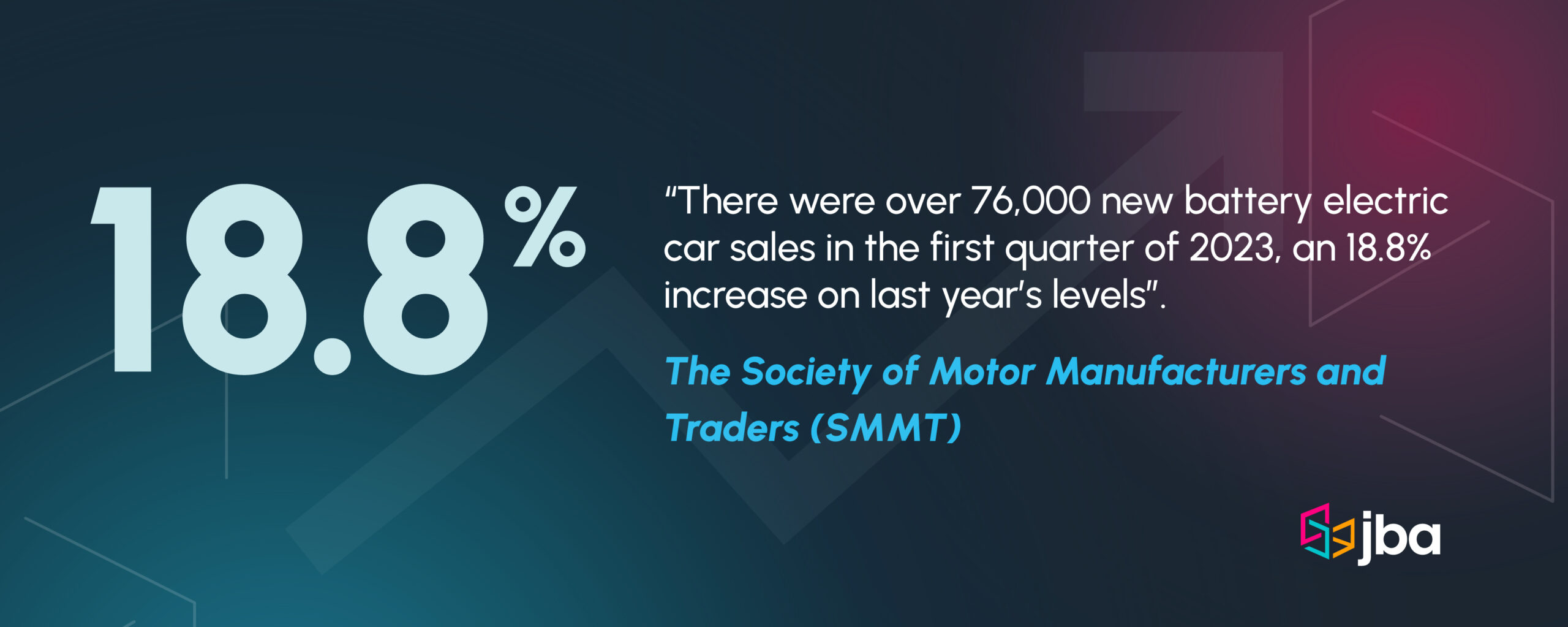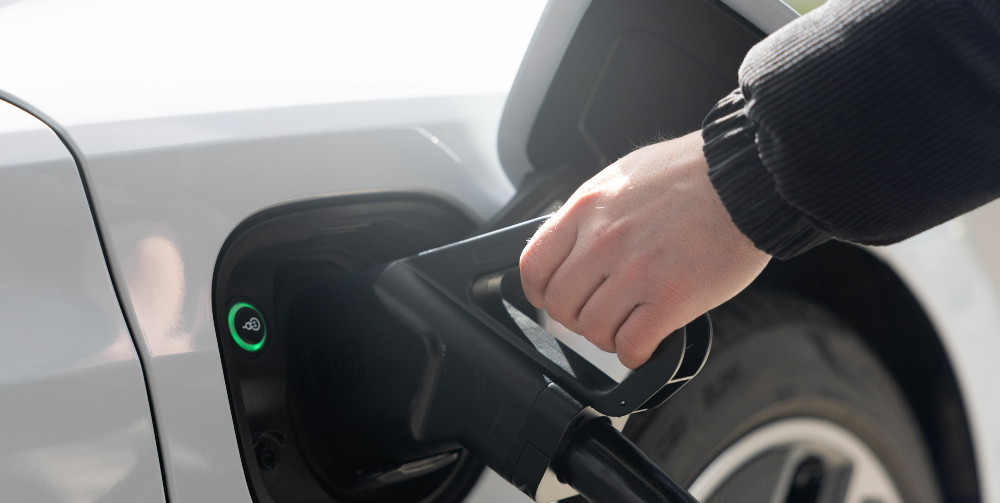When it comes to purchasing an electric car, consumers look for information on the price, insurance premiums and taxes, running costs, and electric vehicle maintenance.
Whilst eco-friendly models are becoming more popular, made more so by the government’s plan to stop selling petrol and diesel cars by 2030, customers still have a lot of questions and anxieties when it comes to making the switch.
For example, they’ll be asking:
Do electric cars cost more than petrol or diesel cars? Which parts are most likely to fail? And which parts are most expensive to replace?
This makes it crucial for automotive companies to adapt, not only by offering electric vehicles but also by understanding the unique challenges and opportunities they present.
In this blog post, we explore the critical insights and knowledge that your team needs to know, focusing on how to maintain, service, and support the growing fleet of electric vehicles, ensuring your team feels confident and knowledgeable when supporting customers throughout their purchase.
Understanding the Growth of Electric Vehicles
Electric vehicles (EVs) have emerged as a transformative force in the automotive industry.
The growth of EV adoption over recent years has been quite remarkable, with an increasing number of consumers choosing cleaner and more sustainable transportation options.
According to a report by the Society of Motor Manufacturers and Traders (SMMT), there were over 76,000 new battery electric car sales in the first quarter of 2023, an 18.8% increase on last year’s levels.

As environmental concerns continue to mount, governments worldwide are also actively promoting EV adoption through incentives, regulations, and infrastructure development.
This shift towards electric mobility not only contributes to lower greenhouse gas emissions but also presents an opportunity for car manufacturers and dealerships to adapt and thrive in this evolving market.
By understanding the factors driving EV and knowing the advantages they offer, car manufacturers and dealerships can position themselves strategically to meet the changing demands of customers and stay more competitive.
It further allows them to improve the customer experience by understanding the anxieties customers might have, their pain points, and any potential barriers that are restricting them from making the switch.
The Importance of EV Maintenance Knowledge
For car manufacturers and dealers, having a thorough understanding of EV maintenance and how this differs from internal combustion engines (ICE) is key as customers will be asking different types of questions.
Remember, customers are still hesitant about making the switch due to anxieties around the unfamiliar territory of electric vehicles (EVs).
Therefore, having a well-trained and knowledgeable team allows you to cater effectively to the increasing number of EV customers, ensuring they receive quality service and that their needs are met.
Let’s take a closer look at some of the things your team will need to know.
Safety considerations for EVs and their unique components
Electric vehicles operate on high-voltage battery systems and involve intricate electronic components that require a thorough understanding of safety protocols.
Unlike traditional internal combustion engine (ICE) vehicles, EVs present unique risks related to electrical shock and handling high-voltage systems. Proper training and knowledge are essential for technicians working on EVs to ensure their safety and the safety of their customers.
Understanding the correct procedures for isolating and de-energising the battery and powertrain systems is critical during maintenance and repair tasks. Equipping your team with the necessary expertise in EV safety protocols can minimise potential accidents and instill confidence in both staff and customers.
How EV maintenance differs from traditional ICE vehicles
Maintaining an electric vehicle significantly varies from a traditional ICE vehicle. The absence of a complex engine with hundreds of moving parts is one of the key differences.
In an EV, the focus shifts towards the battery pack, electric motor, power electronics, and regenerative braking systems.
Consequently, technicians must be well-versed in diagnosing and addressing issues specific to EV components. Battery management, motor efficiency, and software updates become crucial aspects of routine maintenance.
Understanding the intricacies of EV maintenance allows technicians to address potential problems proactively and provide efficient solutions, contributing to improved vehicle performance and longevity.
Ensuring customer satisfaction and trust through informed support
Knowledgeable and well-informed support is the foundation of customer satisfaction and trust in the EV market. Customers investing in electric vehicles expect their chosen dealership to have a thorough understanding of EV technology and maintenance requirements.
When dealership staff can confidently answer questions, address concerns, and explain maintenance procedures to EV owners, it eases their anxieties.
By demonstrating a commitment to staying up-to-date with the latest EV advancements and following best practices, car manufacturers and dealerships can build long-lasting relationships with their customers.
Informed support not only improves customer satisfaction but also encourages loyalty as customers trust your dealership team and the answers/ support they provide.

Key Areas of Electric Vehicle Maintenance
In this section, we’re delving into the key areas of electric vehicle maintenance, exploring the unique components and considerations that differentiate EV servicing from traditional internal combustion engine (ICE) vehicles.
Let’s start with their batteries.
Battery Management and Care
You need to equip your team with the knowledge needed to educate customers on proper battery management and care for electric vehicles (EVs). A well-maintained battery is the heart of an EV, influencing its performance and longevity.
Your team to need to emphasise the importance of customers following the manufacturer’s charging guidelines. They should explain the differences between various charging options, including standard charging and fast charging.
They will also need to deal with questions regarding battery health and degradation, so having a good understanding of battery health and its impact on range and performance is important.
This also includes being able to explain how temperature extremes can affect battery life and discussing strategies for avoiding extreme conditions, providing guidance on maintaining a consistent charging routine, and avoiding overcharging or undercharging. .
Electric Motor Maintenance
Electric motors are the driving force behind electric vehicles, making their understanding crucial for your dealership team. These motors consist of a stator generating a magnetic field and a rotor responding to it for motion. Regular inspections are key to maintain performance and to identify any issues.
Your team needs to understand motor components and interactions, stressing regular checks when interacting with a customer interested in purchasing an EV. They should know the recognisable signs of wear such as odd noises, vibrations, or overheating, which may indicate problems with bearings, connections, or insulation.
While electric motors typically need less maintenance than traditional engines, preventive measures are still vital. Even minor issues can soon snowball, and cleanliness is vital as bits of debris can dramatically impact efficiency.
Unlike traditional engines, electric motors lack oil systems and complex components, translating to simpler maintenance focused on inspections and prompt issue resolution.
Armed with this understanding, your team can confidently discuss electric motor maintenance with customers, enhancing trust and providing valuable insights into the efficiency and innovation of electric vehicles.
EV-Specific Components
Electric vehicles (EVs) have unique components that demand specialised understanding from your team. These parts greatly influence performance, efficiency, and safety, making education crucial for customer satisfaction.
Inverter and Power Electronics Maintenance:
Inverters and power electronics are at the core of EVs, converting battery DC power into AC power for the motor. Your team must learn about their role in motor control and the importance of temperature management. They should also highlight signs of potential issues including unusual noises or lights.
Cooling Systems for Batteries and Motors:
Cooling systems regulate battery and motor temperatures. Your team needs to be able to explain their role in preventing overheating and performance loss. They should also emphasise regular coolant checks and identifying leaks as this knowledge builds trust and ensures vehicle longevity.
By training your team on these EV-specific components, you empower them to confidently explain technology to customers. Informed staff improve credibility, while component knowledge guarantees vehicle reliability.
Training and Education for Dealership Staff
The success of your dealership depends on your team’s ability to adapt to new technologies and meet customer expectations so that they can talk confidently to customers and ease any of their concerns.
Rather than regarding electric vehicles (EVs) as unfamiliar territory that people are still trying to decipher, instilling confidence in your team’s ability to discuss EVs and the way they work, can significantly boost customers’ purchasing comfort.
This is particularly vital for customers who may have never experienced an electric vehicle or even sat in one before, as they are accustomed to traditional internal combustion engines (ICE) and their way of working.
By offering comprehensive, EV-specific training for both your technicians and sales team, you are positioning your business for the future. As the world continues its efforts to reduce carbon emissions, EVs are undeniably on the rise, making this knowledge key for supporting your customers effectively.
Dealership Technicians:
As discussed, unlike traditional internal combustion engines, EVs involve a different set of components, electrical systems, and maintenance procedures. Your technicians must understand the intricacies of EV batteries, electric motors, power electronics, and charging systems. They should be capable of diagnosing and addressing issues unique to EVs, ensuring that customers receive accurate and effective repairs.
Salesteam:
Your sales team plays a critical role in guiding customers through their EV purchasing journey. Their ability to provide accurate information, address customer concerns, and communicate the benefits of EVs in a clear and straightforward way, can significantly influence buying decisions.
Comprehensive EV-specific training empowers your sales team to build customer trust and confidence, translating into customer satisfaction as they will feel more confident about making their purchase.

Customer Engagement and Building Trust
One of the most significant advantages of educating your team about electric vehicle (EV) maintenance is the positive impact it has on customer engagement.
In the evolving automotive landscape, well-informed staff can be the differentiating factor that sets your dealership apart
When customers interact with staff who can explain the intricacies of electric vehicle maintenance in a way they understand, they feel valued and respected instead of being overwhelmed by tech-heavy information.
Furthermore, educated team members can communicate the benefits of EVs to customers such as how the simplified maintenance regimen contributes to cost savings. They can also demystify complex concepts, making them accessible to customers who might not have technical backgrounds and don’t understand the intricacies inside out.
This clear communication helps customers make informed decisions aligned with their needs and preferences, and your sales team is there to guide their decision – not to push them into it.
Electric Vehicle Maintenance: What Your Team Needs to Know
When it comes to electric vehicle maintenance customers often grapple with uncertainty and a degree of unfamiliarity.
Many are used to traditional Internal Combustion Engine (ICE) vehicles and the associated maintenance procedures, making the transition to a new type of vehicle and its operational nuances, seem daunting.
While the increasing adoption of electric cars is inevitable, it is crucial for customers to feel confident before committing to a purchase. Otherwise, they are more inclined to stick to what they know, despite the obvious advantages of EVs.
To alleviate these concerns, it’s important your team receives training in electric vehicle maintenance. This allows them to engage in knowledgeable conversations with prospective customers who are considering their choices. Sometimes, all it takes is addressing a few queries to help customers feel more at ease, and if your sales team can provide these answers, it effectively reduces apprehensions associated with purchasing an electric vehicle.
This can sound like a lot to get right, but we’re here to help. At JBA, we help your team communicate with customers with confidence so that they can effectively engage in conversations about electric vehicles. As we’ve discussed, there can be a lot of anxiety around EVs but through our bespoke training solutions, we help your team support customers through their purchasing journey. To find out more, get in touch.
